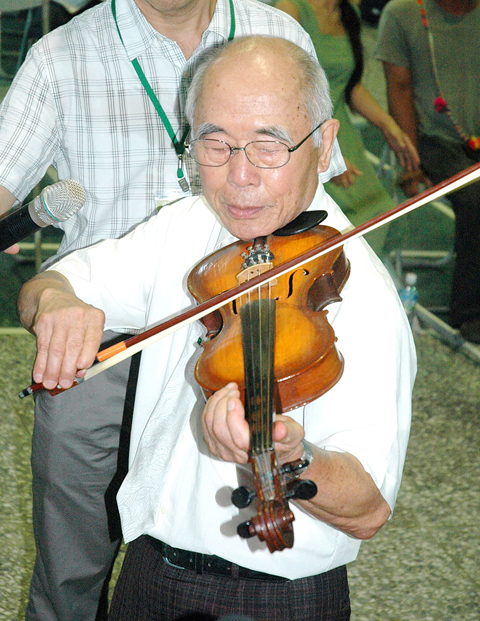Wang Wen-ching (王文清), an 83-year-old former political prisoner, sighed as he recalled the years he spent in the Green Island prison after being convicted for no reason in the 1950s.
He said the one thing that made him proud was the violin he pieced together from whatever materials he could get hold of, and that kept him company during his 15 years behind bars.
Wang was born under Japanese rule and worked for the post office. When the Chinese Nationalist Party (KMT) took over Taiwan in 1945, the Japanese language was banned, and people had to attend classes in Mandarin Chinese. When Wang was 23, his Mandarin teacher was accused of being a communist spy. All 34 students in Wang’s class were found guilty by association and sentenced to 15 years in Green Island Prison without even being questioned.

PHOTO: CNA
One of Wang’s fellow prisoners had a violin that started to rot in the damp conditions. The moldy fiddle seemed symbolic of the prisoners’ own sorry condition, and Wang decided to give it a new life. Wang, who knew nothing about music, said he borrowed the old violin and examined its structure. Then, through the prison shop, he had some juniper wood, bowstring and a wooden hoe handle brought over from Taiwan proper. Wang said it took him a whole month to fashion the hoe handle into a bow.
Lacking tools, Wang gathered washed-up glass from the beach to make implements for sawing, gouging and sanding. To give the wooden parts the required curves and contours, he got access to the kitchen and heated them over a stove.
It took him six months to finish the instrument, Wang said, adding that then he got hold of a Japanese violin music book and went to practice in the pigsty, where his amateurish playing would not disturb the other inmates.
At the end of his sentence, Wang took his precious violin home, where it gathered dust for more than 40 years before he took it out of its case two years ago and restored it to its original condition.

HORROR STORIES: One victim recounted not realizing they had been stabbed and seeing people bleeding, while another recalled breaking down in tears after fleeing A man on Friday died after he tried to fight the knife-wielding suspect who went on a stabbing spree near two of Taipei’s busiest metro stations, Taipei Mayor Chiang Wan-an (蔣萬安) said. The 57-year-old man, identified by his family name, Yu (余), encountered the suspect at Exit M7 of Taipei Main Station and immediately tried to stop him, but was fatally wounded and later died, Chiang said, calling the incident “heartbreaking.” Yu’s family would receive at least NT$5 million (US$158,584) in compensation through the Taipei Rapid Transit Corp’s (TRTC) insurance coverage, he said after convening an emergency security response meeting yesterday morning. National

PLANNED: The suspect visited the crime scene before the killings, seeking information on how to access the roof, and had extensively researched a 2014 stabbing incident The suspect in a stabbing attack that killed three people and injured 11 in Taipei on Friday had planned the assault and set fires at other locations earlier in the day, law enforcement officials said yesterday. National Police Agency (NPA) Director-General Chang Jung-hsin (張榮興) said the suspect, a 27-year-old man named Chang Wen (張文), began the attacks at 3:40pm, first setting off smoke bombs on a road, damaging cars and motorbikes. Earlier, Chang Wen set fire to a rental room where he was staying on Gongyuan Road in Zhongzheng District (中正), Chang Jung-hsin said. The suspect later threw smoke grenades near two exits

Taiwan has overtaken South Korea this year in per capita income for the first time in 23 years, IMF data showed. Per capita income is a nation’s GDP divided by the total population, used to compare average wealth levels across countries. Taiwan also beat Japan this year on per capita income, after surpassing it for the first time last year, US magazine Newsweek reported yesterday. Across Asia, Taiwan ranked fourth for per capita income at US$37,827 this year due to sustained economic growth, the report said. In the top three spots were Singapore, Macau and Hong Kong, it said. South

The Forestry and Nature Conservation Agency yesterday launched a gift box to market honey “certified by a Formosan black bear” in appreciation of a beekeeper’s amicable interaction with a honey-thieving bear. Beekeeper Chih Ming-chen (池明鎮) in January inspected his bee farm in Hualien County’s Jhuosi Township (卓溪) and found that more than 20 beehives had been destroyed and many hives were eaten, with bear droppings and paw prints near the destroyed hives, the agency said. Chih returned to the farm to move the remaining beehives away that evening when he encountered a Formosan black bear only 20m away, the agency said. The bear